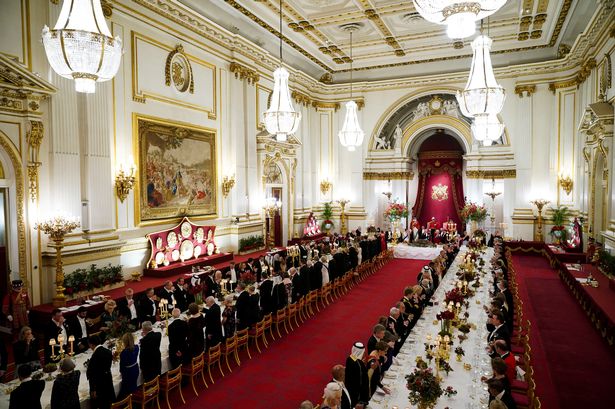At Buckingham Palace, an elegant gathering has taken place as King Charles III and Queen Camilla host a lavish dinner for Emir Sheikh Tamim bin Hamad Al Thani of Qatar, along with his delegation. This prestigious event aims to strengthen the ties between the United Kingdom and Qatar, marking a significant moment in diplomacy and international relations. The ballroom was adorned with opulent decorations to reflect the grandeur of the occasion, creating a fitting atmosphere for such a high-profile visit. Approximately 170 guests, including members of the royal family, dignitaries, and notable figures from various sectors, were invited to partake in this exclusive dinner.
The impressive menu served during this royal affair showcased not only culinary excellence but also a celebration of cultural exchange. Thoughtfully curated by skilled chefs, the dishes represented both British and Qatari influences, ensuring an authentic experience for the Emir and his delegation. Such carefully planned meals at royal events exemplify the efforts made to honor the cultural identities and culinary traditions of the guests while reinforcing the significance of the gathering. The choice of menu reflects a broader commitment to fostering mutual appreciation through shared experiences, further emphasizing the importance of hospitality in diplomacy.
Throughout the evening, the atmosphere was charged with a sense of camaraderie and respect. Conversations flowed freely as attendees engaged in discussions about various topics, ranging from trade partnerships to cultural collaborations. This social interaction not only serves to strengthen personal relationships among the elite guests but also helps to advance discussions on critical issues facing both nations. The King’s role as host placed him in a position to facilitate these dialogues, ensuring that the visit is not merely ceremonial but a chance for substantive engagement and commitments.
In addition to the dinner, the two-day visit included various other activities and meetings designed to enhance bilateral relations. These engagements allowed for deeper discussions on mutual interests, particularly in areas such as investment, security, and education. The Emir’s visit is timely and significant, especially considering the evolving geopolitical landscape and the growing importance of Qatar as a key player in the Middle East. Increased dialogue and cooperation are essential for addressing shared challenges, and this visit serves as a catalyst for future collaboration between the two nations.
The presence of both the King and Queen during the visit underscores the royal family’s commitment to fostering international relationships. Their involvement not only demonstrates the British monarchy’s role in diplomacy but also reflects a willingness to engage with leaders from other nations on matters of mutual concern. This royal hospitality aligns with the broader objectives of enhancing the U.K.’s standing in the world and promoting the values of openness and collaboration. As the evening progressed, it became clear that such events at Buckingham Palace are not just ceremonial; they play a pivotal role in shaping international relations.
In summary, the gathering at Buckingham Palace signifies more than just a lavish dinner; it represents a crucial meeting point for diplomatic relations between Qatar and the United Kingdom. The careful planning that went into the event, from the guest list to the menu, illustrates a dedication to fostering goodwill through cultural exchange. As nations face complex global challenges, moments like these offer valuable opportunities for dialogue and building lasting alliances. With the Emir’s visit, the King and Queen have initiated an essential platform for both countries to work together toward shared goals, reinforcing the importance of continued engagement in an interconnected world.














